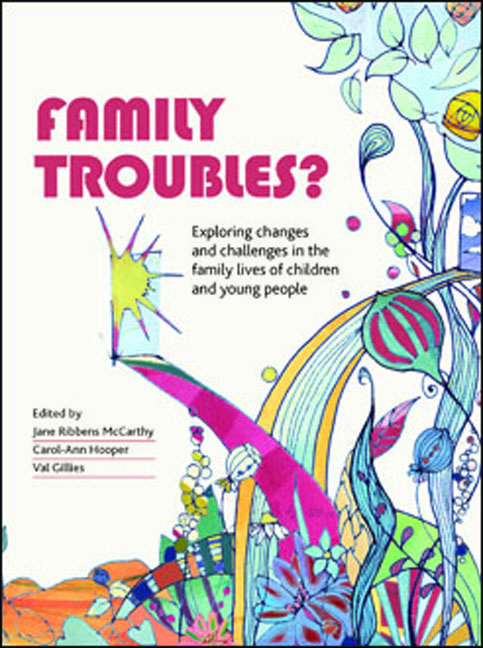Book contents
- Frontmatter
- Contents
- Notes on contributors
- Foreword
- Preface
- 1 Troubling normalities and normal family troubles: diversities, experiences and tensions
- Part One Approaching family troubles ? Contexts and methodologies :Introduction to Part One
- Part Two Whose trouble ? Conteste d definitions and practice: Introduction to Part Two
- Part Three The Normal, The Troubling And The Harmful?: Introduction to Part Three
- Part Four Troubles and transitions across space and culture: Introduction to Part Four
- Part Five Working With Families: Introduction to Part Five
- Index
5 - Family troubles, methods trouble: qualitative research and the methodological divide
Published online by Cambridge University Press: 07 September 2022
- Frontmatter
- Contents
- Notes on contributors
- Foreword
- Preface
- 1 Troubling normalities and normal family troubles: diversities, experiences and tensions
- Part One Approaching family troubles ? Contexts and methodologies :Introduction to Part One
- Part Two Whose trouble ? Conteste d definitions and practice: Introduction to Part Two
- Part Three The Normal, The Troubling And The Harmful?: Introduction to Part Three
- Part Four Troubles and transitions across space and culture: Introduction to Part Four
- Part Five Working With Families: Introduction to Part Five
- Index
Summary
Research in the social sciences is characterised by a healthy fragmentation; scholars operate within multiple paradigms of inquiry that are premised upon different assumptions about the nature of reality and the purposes of scholarship. Guba and Lincoln (1994) identify five orientations to social research and delineate the ontological premises of each. As their work suggests, most traditions can be seen as falling somewhere on an ontological continuum of realism and relativism. On the side of realism, positivism views the social world as operating much like the natural world, according to laws that have predictable, measurable effects and are consistent across time and space. From this perspective, social and psychological forces animate individuals in much the same way that gravity animates physical objects. At the other end of this continuum, constructivism holds that the social world is different from the natural world because humans use symbols, are highly reflexive and make meaningful choices about their conduct. From this perspective, social life is patterned but not predictable, and all human conduct is culturally and situationally contingent.
Although the relationship is imperfect, different paradigms of inquiry tend to align with particular methodological traditions. Positivism often partners with quantitative methods, most often in the form of surveys and experiments, and these methods follow the same logic of inquiry that is used in the natural sciences. Because the primary goal is to identify the causes of human conduct, quantitative researchers’ chief concerns include objectivity, the isolation of variables and control over the conditions of research. Constructivism, on the other hand, often couples with qualitative methods, such as in-depth interviews and participant observation. These methods are designed to capture and convey meaning. Because the primary goal is to understand how people make sense of the world and their own conduct, most qualitative researchers view empathy as an asset and social context as a prerequisite for understanding.
As Michael Rutter (Chapter Four) notes, it is important not to overstate the differences between such contrasting methodological approaches. Insofar as these traditions are empirical and systematic, they adhere to the scientific ethos that characterises all research in the social sciences. They have explicit criteria for assessing robustness and generate knowledge that is generalisable (although the manner by which they move from the specific to the general is different, as I later discuss).
- Type
- Chapter
- Information
- Family Troubles?Exploring Changes and Challenges in the Family Lives of Children and Young People, pp. 59 - 70Publisher: Bristol University PressPrint publication year: 2013

